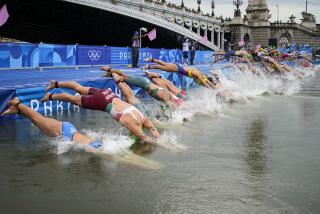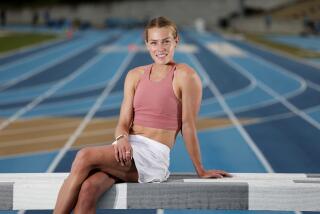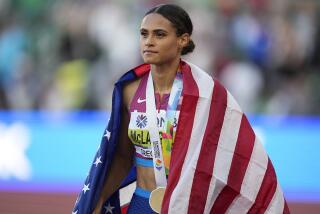Gwen Jorgensen of U.S. Olympic team a convert to the triathlon
- Share via
It wasn’t so long ago that Gwen Jorgensen got a call from U.S. triathlon officials.
They knew she had competed as a runner and swimmer in college. Now that she had graduated, they wondered if she might like to try something new.
But Jorgensen had pretty much put sports on the back burner to start a career in accounting. Besides, the word “triathlon” conjured images of the grueling Ironman competition, athletes pushing themselves to the point of collapse.
“No,” she told them, “that doesn’t interest me.”
Which makes it all the more surprising that — just a few years later — the 26-year-old will race in the triathlon at the 2012 London Olympics, an overnight success in a sport she has grown to love.
“A huge blessing” is what she calls this unexpected journey. A national team official puts it another way: “She has definitely been on the fast track.”
Growing up in Wisconsin, Jorgensen always loved to swim. She would be in the pool for practice before school and back again in the afternoon.
It did not matter that, through high school, her best results came on the track, where she proved to be a gifted middle-distance runner. Upon entering the University of Wisconsin, she decided to focus on swimming.
“I was one of the worst ones on the team,” she recalled. “Never scored at conference. Never made it to the NCAAs.”
If nothing else, struggling in the water taught her to be patient and determined, pushing hard in workouts with no guarantee of success.
Eventually, as an upperclassman, she went out for track and cross-country, and soon became an All-American in both.
“Gwen’s got great natural speed,” said Jim Stintzi, the women’s track coach at Wisconsin. “And she’s a fighter. She loves to compete.”
This talent caught the eye of Barb Lindquist, a former Olympian who runs USA Triathlon’s college recruitment program. With few young athletes competing in this event at the high school and college levels, she scours the country for potential converts.
“Gwen was a pretty unique situation,” Lindquist said. “Most other athletes aren’t that solid in two sports.”
Though Jorgensen seemed hesitant, Lindquist gave her the name of a triathlon coach in Wisconsin and asked her to “take baby steps.” Three things prompted Jorgensen to give the sport a try.
First, the Olympic triathlon differs significantly from the Ironman. The event has much shorter legs with a 1.5-kilometer swim, a 40-kilometer bike race and a 10-kilometer run.
Second, Jorgensen was nursing a stress fracture from her final season in track, so the pool and bike offered low-impact workouts. Third, working as a new accountant at Ernst & Young, she missed competitive athletics.
New triathletes tend to face a steep learning curve. Jorgensen would be no different.
“Growing up, I hated riding a bike,” she said. “My parents had to bribe me with ice cream or some other treat to go on rides.”
But cycling is the least critical discipline in the Olympic triathlon because it is the middle leg and because the rules allow for drafting, which means the racers can clump in packs, helping each other along.
“Your race can be lost as soon as the swim is over,” said Andy Schmitz, the national team’s high performance general manager. “And a lot of the time, the race is won in the run.”
Jorgensen’s debut in March 2010 was a bit of a shock — “I didn’t fully realize what I had gotten myself into” — but an eighth-place finish encouraged her to continue.
The cycling became easier and even enjoyable over time. Team officials sensed they had a budding star on their hands.
“A lot of it has to do with her raw ability,” Schmitz said. “She has beautiful technique in both the swim and run.”
Late last year, after just 17 months of racing, she earned one of three spots on the U.S. Olympic women’s team by finishing second at a London event, competing on the same course that will be used this summer.
Everything since then has been a whirlwind, Jorgensen taking a leave of absence from her job to train full time. Last week, she finished a disappointing 51st at an International Triathlon Union event in San Diego.
“I have a lot of stuff to work on,” she said. “I need to nail my transitions and make sure of what I’m doing on the bike.”
This relative newcomer is still getting used to the idea that in less than three months she will head for London to compete on the world’s grandest athletic stage.
A lot has changed in the past few years.
“I loved watching the Olympics as a kid, but I don’t ever remember seeing myself in them,” she said. “I really do think I have the best life right now.”
twitter.com/LATimesWharton
More to Read
Go beyond the scoreboard
Get the latest on L.A.'s teams in the daily Sports Report newsletter.
You may occasionally receive promotional content from the Los Angeles Times.







